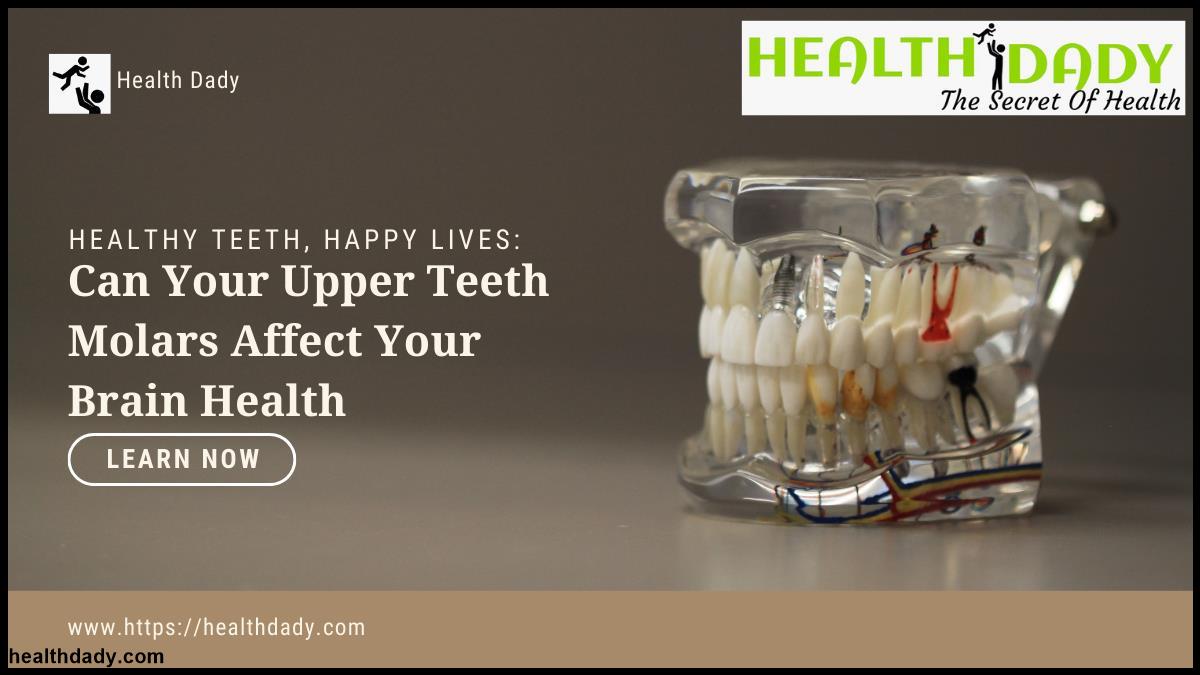Wondering, can your upper teeth molars affect your brain health? Research suggests that the condition of your teeth, could influence cognitive abilities.
Table of Contents
Can Your Upper Teeth Molars Affect Your Brain Health
Overall health requires one to maintain good dental hygiene. What happen if one neglects his teeth? Poor dental health causes various dental issues. One such dental issue which arises from neglecting oral health is the deterioration of the upper molars.
Wondering, can your upper teeth molars affect your brain health? Research suggests that the condition of your teeth, particularly the upper molars, could influence cognitive abilities. Read below to know more about this in detail.
Teeth and Your Quality of Life
The link between quality of life and oral health is sometimes neglected, yet it is rather significant. Healthy upper molar teeth can have a significant impact on your communication skills and self-esteem.
For those who prioritize dental health, here's a brief summary of the advantages of maintaining strong teeth:
- Enhanced speech clarity
- Reduced risk of certain cancers
- Lower likelihood of heart-related diseases
- Decreased stress levels
- Boosted confidence
- Improved mental well-being
Understanding the Link Between Cognitive Function and Oral Health
There is a concerning relationship between tooth loss, particularly in the upper molars, and cognitive decline. A study highlighted that when the upper first molars were removed from older mice, it resulted in notable cognitive issues.
These included a decline in working memory and increased levels of restlessness. The researchers discovered that these cognitive changes were tied to shifts in brain function. This is specifically within the hippocampus and hypothalamus which are the two key regions responsible for memory processing and emotional control.
How Tooth Loss Impacts Cognitive Function
Tooth loss can influence cognitive function through various mechanisms like:
- Mechanical Pathway
When teeth are lost, the ability to chew effectively diminishes. This condition leads to reduced stimulation of the masticatory motor system. This decline in stimulation can impair blood flow to the brain and decrease sensory input from peripheral receptors, potentially resulting in the degeneration of related brain areas.
- Aggravation Pathway
Tooth loss can worsen the situation for individuals with existing neurodegenerative disorders. It may further increase the nerve damage due to inflammatory processes. This may increase the amount of amyloid present in the brain which is the main reason for Alzheimer's disease.
How Dental Issues Affect Your Brain Function
- Gum disease and Alzheimer's
Infection in gums, if left untreated, would cause serious gum diseases like gingivitis. Periodontists say the root cause of the progression of gum diseases is a microbe named P.gingivalis. When gum disease reaches an advanced level, the bacteria will release a poisonous fluid into the bloodstream, which can lead to rheumatoid arthritis, diabetes, heart disease, stroke, and chronic obstructive pulmonary disease (COPD).
Recent studies reveal that the gum infectious bacteria can move on its own to the brain tissue.
It secretes protein and enzyme by-products when it reaches the brain. They destroy the nerve cells in the brain. It will negatively impact the health of your brain and treat memory issues such as dementia and Alzheimer's disease.
- TMJ Disorders and lowered brain functions
The temporomandibular joint will connect your skull with your jawbone. Nerves coming from the brain are dispersed throughout the body with the aid of the spinal cord and the base of the skull. Any abnormality or obstruction in the skull will interrupt the transference of nerve signals.
It lies superior to the nasal cavity and behind the eyes, but the Temporomandibular joint is in front of your eyes and to either side of your skull. Hence, it is clear that when you encounter TMJ disorder due to misaligned jaws or teeth grinding, it will damage your brain functions.
According to recent studies, individuals with chronic TMJ issues experience alterations in the white matter of their brains, which are mirrored in decreased brain function. Dizziness, headaches, bewilderment, mental disorientation, and other issues are experienced by these victims.
How to Maintain Upper Molar Teeth
- Brush your teeth twice daily, reaching upper molars with a tilted brush angle.
- Floss daily to remove the food that is trapped between molars.
- Ensure enough water is consumed to rinse food particles and bacteria from the surfaces.
- Make an appointment with your dentist if you experience any sensitivity or pain in your molars.
Final Thoughts
Hopefully, this read answered your question can your upper teeth molars affect your brain health? It is clear that your oral health is important because it affects your brain. So, take your time and maintain your oral health properly.
Suppose you experience any pain or sensitivity in your teeth, make sure to visit the dentist quickly to prevent potential complications. Taking proactive steps now can make a big difference in both your dental and cognitive health over time.

